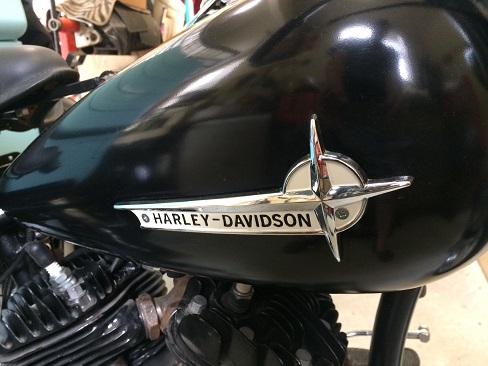Harley 45 Flathead (W and G Series)
Article by Mark Trotta
Advantages of a flathead (side-valve) engine over an OHV (overhead valve) engine were cost of manufacture and simplicity. With valves positioned in the engine block beside the piston, instead of in the cylinder head as in an OHV engine, push rods and rocker arms were not needed. Cylinder heads need only be a simple casting with threaded holes for the spark plugs.
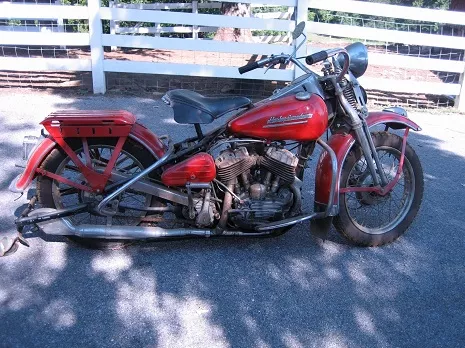
Harley W Series
The W-series (1937-1952) made up the majority of Harley V-Twin Flatheads, and were the basis for the WLA military bike, WR factory racer, and others. A bore and stroke of 2.75" x 3.18" displaced 746cc, advertised as 750cc, which is also 45 cubic-inches.
Harley G Series
The three-wheeled Servi-Car (1932-1973) was powered by the same engine, but had a "G' prefix on the engine number. It was essentially the same as the W-series motors, with only minor differences such as the carburetor.
Harley 45 Flathead Models
- W - Standard Low Compression
- WL - High Compression
- WLA - Military (USA)
- WLC - Military (Canada)
- WLD - Sport Model
- WR - Factory Racer
- G and GL - Servi-car (kick-start)
- GA - Servi-car w/o Tow Bar
- GE - Servi-car with Electric Start (1964 to 1969)
Harley WL Solo
The WL series flatheads were manufactured from 1937 until 1952 and featured a "high-compression" motor. The compression was increased through use of different cylinder heads.
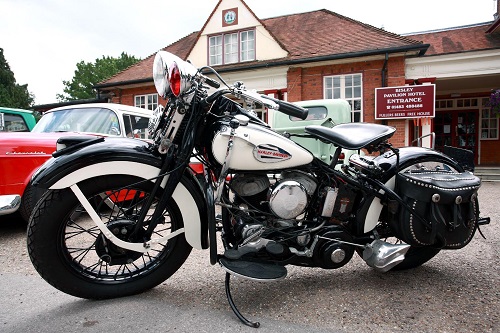
In stock trim, 45 WL output was about 21 horsepower. Standard compression ratio was 4.5:1, which increased to 4.75:1 in 1941. Remember that at this time in America, there was no high-octane gasoline to allow high-compression engines to operate.
Harley-Davidson WLA
During the years 1940-1945, nearly all Harley-Davidson motorcycle production was for military use. The vast majority was the WLA military bike. Accessories included a luggage rack, ammo box, and leather rifle scabbard. Painted in olive drab, bikes were equipped with blackout lights to reduce nighttime visibility.
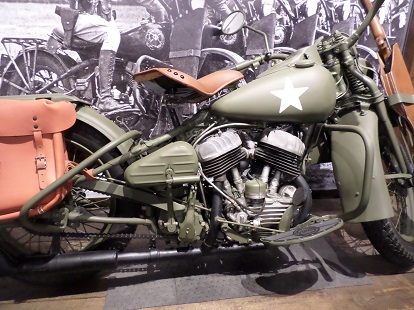
Read: Harley WLA History
When World War II was over, there was a large surplus of WLA bikes, most of them being sold very cheaply. In America, these surplus military models became some of the first modern-day bobbers and choppers.
Harley WR Racer
In 1946, Harley introduced the 45ci WR flathead racer, designed to compete in AMA racing. Under AMA's Class C rulings, flathead motors were allowed to displace 750cc, while OHV motors were limited to 500cc.
The WR factory racer was the 45's highest output model. With increased compression and hotter cams, the 750cc WR shared a large number of parts with the mass-produced military WL series. The WR racer saw considerable success, competing against rival Indians on dirt track speedways throughout the 1930s.
Korean War Harley
During the Korean War, manufacture of WLA military bikes started up again (1950-1952). These were essentially the same as WW2 bikes, with minor differences such as paint and accessories.
***************************
Until the Sportster surpassed it in 1998, the 45 flathead was Harley-Davidson's longest running engine in production.
Throughout it's 41-year long production run, engine bore and stroke remained the same. This makes parts interchangeability between different years excellent.
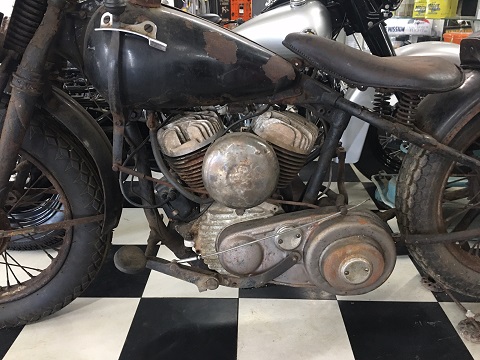
Picture Courtesy American Classic Motorcycle Museum
Harley 45 VIN Numbers
Stamped in the left engine case, Harley 45 serial (VIN) numbers start with the last two digits of the year, followed by the letter designation, then a 4 or 5 digit assembly sequence code.
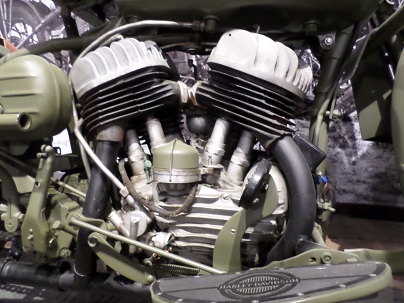
NOTE: All WLA military bike VIN's began with "42", regardless of the year they were actually produced. This was unique in Harley-Davidson history, and presumably done to simplify paperwork.
Although pre-1970 Harley-Davidson motorcycle frames were not numbered, engines were usually sequentially-numbered. So, even though they all have the same "42 WLA" designation, it's possible to identify the year of manufacture from casting numbers and date codes on the engine cases.
Harley 45 Belly Numbers
This example will help decipher the engine case numbers on your Harley 45 motor. In number 361-1722, the number 3 will probably indicate a round top case. The second and third digit is the year (1961), and will probably be stamped in a closed-top letter style with a short horizontal stroke across the top. The four numbers after the dash are a sequential assembly-line number.
If you're building a Harley 45 motor from the cases up, belly numbers that match usually mean that line-boring may not be required, although its always a good idea to check.
G-Series Motors
Most Harley Servi-car motors are stamped 'G' or if it's an electric start (1964-1973) may be stamped 'GE'. Very early models may be stamped 'GA' or 'GD' or 'GDT'.
The letters (up to four) are the model code. The two numbers after the letters are the production year, and the remaining numbers are the production number.
**************************
Harley 45 Shift Pattern
The shifting patterns for pre-1947 three-speeds are 1-N-2-3 for solo bikes, and R-1-N-2-3 for trikes.
The shifting patterns for 1947 through 1973 three-speeds are 3-2-N-1 for solo bikes, and 3-2-N-1-R for trikes.
**************************
Harley 45 Frame
Like any vintage factory piece, a good original frame will increase the value of your motorcycle restoration. Any 1941 through 1973 Harley 45 engine will fit into any 1941 through 1952 45 Solo frame.
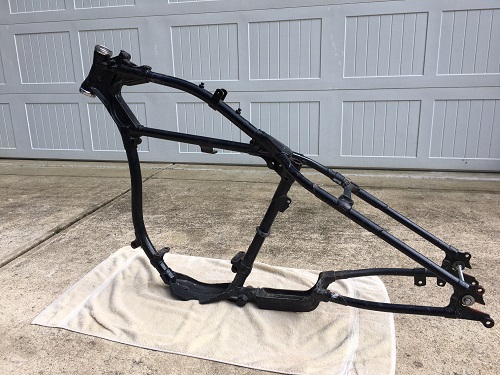
Read: Harley 45 Frame Choices
Unless you're proficient and measuring and welding, beware of frames that have been modified (raked neck, missing brackets, etc). And be aware that some people make Solo 45 frames out of Servi-Car frames.
**************************
Spark Control Grip
Retarding the distributor timing helps cold engine starting, and on early Harley flathead models this was done manually. The left hand grip was referred to as the "spark control" grip.
Before kick-starting the engine, the rider twisted the cable-activated left grip outward, moving the ignition timer outward. This would retard the ignition timing. Once the engine started and was warmed up enough, he would twist the grip back inward to it's fully advanced normal running position. Sometimes when riding, a rider might retard the distributor slightly to avoid engine knock under heavy load or acceleration.
Auto Advance Timer
In 1964, flathead 45 Servi-cars were upgraded with "auto advance" ignition timers. Auto-advance doesn't make an engine run any better, it just makes it easier to operate.
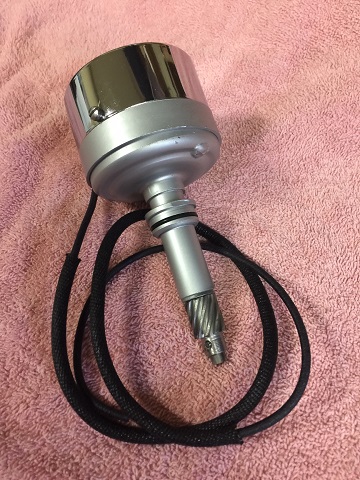
Read: Harley 45 Timer And Ignition
Mechanical and auto advance ignition timers are interchangeable with each other. Custom bike builders favor the latter because it's visually cleaner; removing the spark control grip and cable unclutters the handlebar area.
Harley 45 Magneto
High performance flatheads like the WR factory racer were equipped with magneto ignition. Unlike an ignition timer, they didn't require a coil or battery to produce spark. Instead, spark is created by internal magnets. Magnetos work well at higher speeds, but produce weaker spark at low RPMs.
Harley 45 Generator
There are two types of generators found on Harley-Davidson 45 flatheads. Early-style motors (1937 to 1958) have a three-brush generator, which is mounted to the engine with two 1/4" bolts, and utilizes a strap which goes around the generator body.
Later motors (1959-1965) have a two-brush generator which has two 5/16" bolts holding it in place, and does not require a strap.
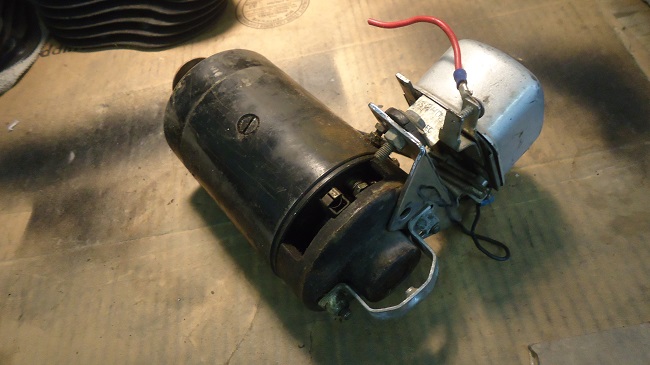
Your classic Harley's generator really doesn't charge the battery until engine rpm is considerably higher than idle. Trips that are less than 15-20 miles are typically not enough to recharge the battery's losses from starting.
Read: Harley Generator - Repair or Replace?
Servi-Car Alternator
Servi-car 45 motors from 1966 and later came with a car-style alternator which was externally driven by a belt.
**************************
Related Articles:
Harley 45 Engine Teardown and Inspection
Harley 45 Bottom End Rebuild
Harley 45 Cam Timing
Harley 45 Cylinders and Heads
Harley 45 Scavenger Oil Pump Repair
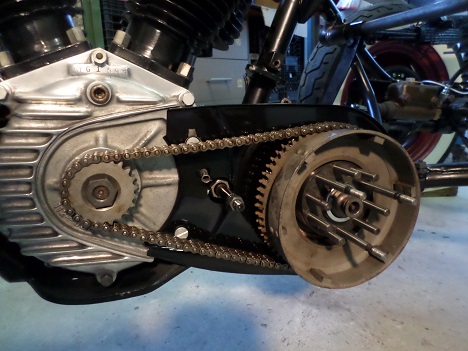
Read: Harley 45 Drivetrain
